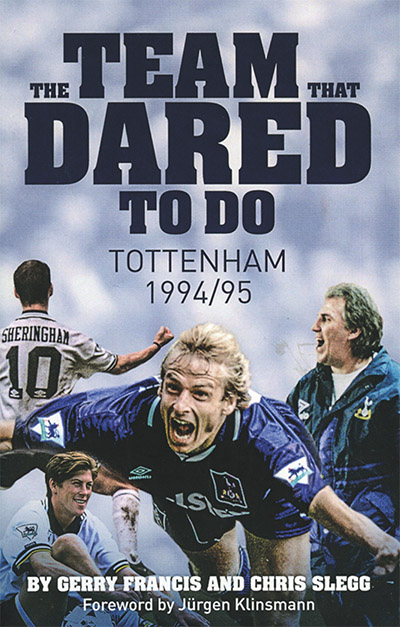
by Gerry Francis and Chris Slegg
Pitch Publishing, £16.99
Reviewed by Alan Fisher
From WSC 377, July/August 2018
Buy the book
On a Tuesday night in late August 1994, I sat spellbound at the very back of the away end at Portman Road as Tottenham destroyed Ipswich with an exuberant display of attacking brilliance. Jürgen Klinsmann, a transfer coup out of the blue, partnered Teddy Sheringham, behind them Ilie Dumitrescu alongside young talents Darren Anderton and Nicky Barmby. Together they were the Famous Five, their manager Spurs legend Ossie Ardiles. Three years before, Spurs nearly went bust and began this season hamstrung by a 12-point reduction plus an FA Cup ban because of financial indiscretions. Now, nothing could go wrong.
Hope swiftly evaporated as Ardiles’ tactical shortcomings were exposed. Less total football, more total disaster. As centre-half Colin Calderwood put it on behalf of his fellow defenders: “Gaffer, you’re talking about the Famous Five all the time, what about the Shit Six?”
This forms the first part of an entertaining, detailed account of Spurs’ 1994-95 season, introducing the book’s core, the diary of Gerry Francis who took over as manager in October. Appalled at the players’ organisation and fitness levels, he sets about dragging the club into the modern era. An attack-minded footballer himself, Francis the manager goes against type with an emphasis on the virtues of hard work and discipline that is positively Victorian. He’s contemptuous of players who avoid hard graft by operating “in the hole”. The players respond to his Tuesday running programme, repeated defensive drills and video analysis self-edited on a machine Alan Sugar grudgingly provides. With points restored and Cup ban overturned, Spurs climb the table and reach the semi-final, only to lose to Everton.
Journalist and Spurs fan Chris Slegg skilfully weaves together the three strands of diary, player interviews and match reports to tell the highs and lows of the season, lovingly recreating the highlights of Klinsmania and some memorable moments along the way. Like the team, the diary is a let-down. Francis is thoughtful and committed, deserving a better reputation than he currently has among Spurs fans, but seldom offers greater insight than the accompanying match reports. A fair proportion appears to be written well after the event, thus losing the impact of contemporaneous reflection. The most vivid passage covers the callous manner in which he was ousted from QPR.
More rewarding are Slegg’s interviews with former players, especially those less lauded such as David Howells, Stuart Nethercott and Dean Austin. Their pleasure at playing the most enjoyable football of their careers and affection towards the club is tempered with the poignancy of what might have been. Howells played for years with the sense that Spurs could be something special but it never materialised. Bedevilled by injury, Anderton’s voice trails away as he wonders if Spurs’ medical team were up to scratch.
To his great credit, Slegg breathes life into a season when, frankly, Spurs achieved little. Then again, promising much and failing to deliver is the quintessential Spurs story.